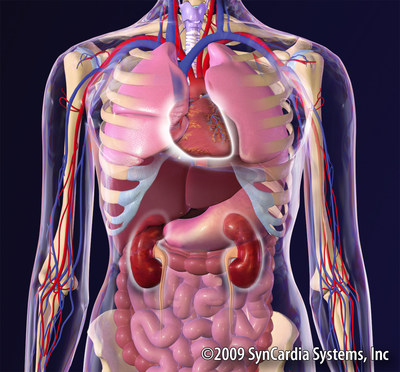TUCSON, Ariz., March 10, 2015 /PRNewswire/ -- The first single-center report, “Combined Heart-Kidney Transplantation After Total Artificial Heart Insertion,” in Transplantation Proceedings discusses doctors’ experience with implanting the SynCardia temporary Total Artificial Heart into two consecutive patients as bridges to dual heart and kidney transplants.

“The (Total Artificial Heart), by virtue of its capability of providing pulsatile flow at 6-10 (liters per minute), may be the mechanical circulatory support device most likely to recover patients with marginal renal function and advanced heart failure,” conclude the 10 authors of the report published in the January-February 2015 peer-reviewed journal Transplantation Proceedings.
Find out more about kidney function and the SynCardia Total Artificial Heart
“Both patients...had evidence of chronic kidney disease (stage 3) upon admission, as well as heart failure,” the report says, “and subsequently developed dialysis-dependent renal failure.”
- A woman, 55, with a history of rhythm-related cardiac arrest was admitted “with progressive decline in her functional status,” the report says. She declined into cardiogenic shock and became anuric (absence of or defective urine excretion). After receiving the SynCardia Heart, she went on kidney dialysis. After 148 days of support, she received a heart-kidney transplant and was discharged from the hospital 15 days later.
- A man, 56, with a history of heart disease developed decompensated heart failure. After an unsuccessful attempt to treat his heart failure with medication, he received a SynCardia Heart. The patient required dialysis until he was transplanted with a donor heart and kidney 123 days later. He was discharged from the hospital two weeks after the transplant.
On the basis of the doctors’ experience with the two patients, “we consider (the Total Artificial Heart) a safe and feasible option for bridging carefully selected patients with heart and kidney failure to combined (heart-kidney transplants),” the report says.
In a separate study, doctors worldwide found that the SynCardia Total Artificial Heart support often leads to the recovery of kidney failure. Of the 30 post-implant renal failure patients who were supported by the SynCardia Total Artificial Heart for a year or more, 73% recovered kidney function.
With recent FDA approval of the 13.5-pound Freedom® portable driver, clinically stable SynCardia Total Artificial Heart patients who require kidney dialysis can be discharged from the hospital and receive their dialysis as outpatients.
”...the Freedom driver may allow outpatient management at substantial cost savings,” the Transplantation Proceedings report says. The Freedom portable driver powers the SynCardia Heart while providing much improved mobility to the patient. It can be carried in a backpack or shoulder bag or wheeled on a cart.
For additional information, please visit: http://www.syncardia.com/
Like SynCardia on Facebook
Follow SynCardia on Twitter @SynCardia
Connect with SynCardia on LinkedIn
Share and Discover on Google+
About the SynCardia temporary Total Artificial Heart
SynCardia Systems, Inc. in Tucson, Arizona is the privately-held owner and manufacturer of the world’s first and only FDA, Health Canada and CE approved Total Artificial Heart for use as a bridge to transplant for people suffering from end-stage biventricular heart failure in which both ventricles can no longer pump enough blood for a person to survive.
More than 1,400 implants of the SynCardia Total Artificial Heart account for over 400 patient years of life on the device. Since January 2010 more than 550 SynCardia Hearts have been implanted.
The youngest patient to receive a SynCardia Heart was 9 years old; the oldest was 80 years old. The longest a patient has lived with a SynCardia Heart was nearly four years (1,374 days) before receiving a successful donor heart transplant Sept. 11, 2011.
SynCardia Systems also manufactures the Freedom® portable driver, which powers the SynCardia Heart while allowing clinically stable patients to be discharged from the hospital to live at home and in their communities. The wearable Freedom driver has been used by more than 200 patients, accounting for over 130 years of support.
Photo: http://photos.prnewswire.com/prnh/20150309/180539
To view the original version on PR Newswire, visit:http://www.prnewswire.com/news-releases/medical-journal-describes-2-consecutive-syncardia-total-artificial-heart-patients-bridged-to-dual-heart-kidney-transplants-300047872.html
SOURCE SynCardia Systems, Inc.
 Help employers find you! Check out all the jobs and post your resume.
Help employers find you! Check out all the jobs and post your resume.




